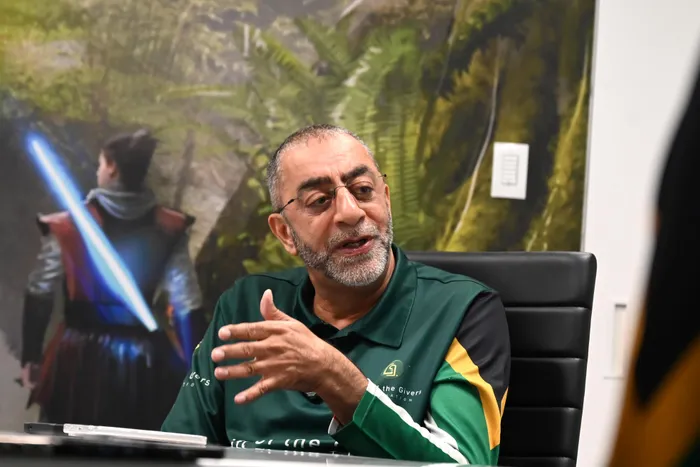
Gift of the Givers founder and chairperson Dr Imtiaz Sooliman says damning allegations against high-ranking police officials and politicians made by KZN police commissioner Lt-General Nhlanhla Mkhwanazi are a “game changer”.
Image: Ayanda Ndamane / Independent Media
In a moving indictment of South Africa’s coalition politics, Dr Imtiaz Sooliman, founder of the humanitarian organisation Gift of the Givers (GoTG), has decried the state of local governance and the insidious political infighting that continues to plague millions of citizens across the nation. Speaking candidly at a media conference on Tuesday, Sooliman lamented how personal ambitions have overshadowed the urgent need for service delivery, leaving essential decisions, including the national budget, perilously unmade.
His remarks came in the wake of revelations from both the Ad Hoc Committee and the Madlanga Commission, which have unearthed significant corruption claims within high-ranking circles, especially voiced by KwaZulu-Natal police commissioner Lt-General Nhlanhla Mkhwanazi.
“These allegations are a game-changer,” Sooliman asserted, underscoring the pivotal role such exposure plays in fostering civic consciousness and initiating necessary change. “People are becoming more aware and are starting to demand that things be done the right way,” he added.
Sooliman was unflinching in his criticism of the political status quo, and decried a “government of selective unity” whereby co-operative governance is stifled by ego-driven politics. “Today it’s about showing ‘you’re the bad guy’. It’s always about power, never about the people,” he declared, emphasising the urgent need for a re-evaluation of priorities within government. “When three or five people can’t get along, 65 million people pay the price,” he lamented, drawing attention to the far-reaching ramifications of dysfunctional leadership.
Yet, despite the ethical predicaments that hamper progress, Sooliman expressed a glimmer of hope, citing the presence of "good people" within governmental structures who are eager to instigate change. The challenge, he noted, lies in the silence of these individuals, which the recent commissions are starting to erode: “What Mkhwanazi is doing is giving strength to those who want to speak out. It’s breaking the fear factor.”
Looking forward, Sooliman urged South Africans to take charge of their political destiny, encouraging them to vote in the upcoming 2026 local government elections for changemakers within their communities – individuals intent on prioritising the public good over personal gain. “Show the political parties a point that if they can’t deliver, you can do it yourself,” he advised, advocating for a “coalition of civil society” to signal to politicians that accountability is paramount.
His concerns were echoed by several political figures; Tertius Simmers affirmed that, “the DA shares Dr Sooliman’s concern for the state of governance in South Africa,” emphasising the need for a whole-of-society approach that prioritises collaboration over chaos. GOOD Party Secretary-General Brett Herron remarked that, “Dr Sooliman is correctly voicing the feelings of many South Africans,” urging ethical and capable leadership as essential in steering the country toward a better future.
chevon.booysen@inl.co.za
Related Topics: